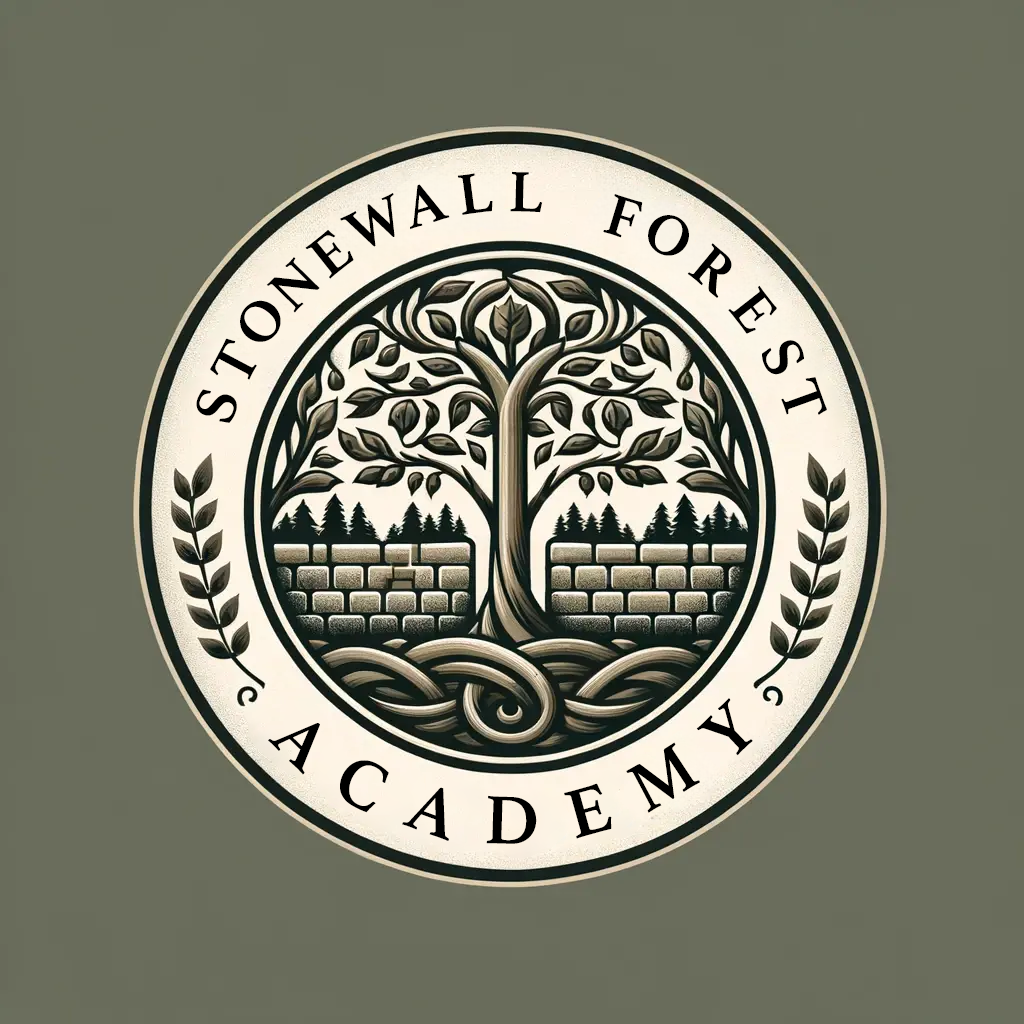General Program Questions
What is a homeschool tutorial?
A homeschool tutorial is an educational program where families who homeschool partner with experienced educators to enrich their child’s learning. Children remain registered as homeschoolers with the state but attend structured, small-group classes a few days per week.
At Stonewall Forest Academy, your child learns alongside peers in a nature-rich, Montessori + Charlotte Mason-inspired environment, while you retain control of your child’s overall education. It’s the best of both worlds — you guide the homeschool journey, while we provide expert-led instruction, a supportive community, and engaging hands-on learning.
What is Stonewall Forest Academy?
Stonewall Forest Academy is a licensed-exempt homeschool tutorial in Pleasant Shade, TN, serving families across Smith, Jackson, Trousdale, Macon, Wilson, and Putnam counties.
We blend Montessori methods, Charlotte Mason philosophy, and nature-based learning to create an enriching environment for homeschoolers. Parents remain the primary educators and are responsible for meeting Tennessee’s homeschool requirements, while we support you with structured, small-group learning.
Do parents need to register as homeschoolers?
Yes. Since Stonewall Forest Academy is a tutorial and not a licensed school, families must register their children as homeschoolers in Tennessee.
You can register:
- Through a homeschool umbrella school (recommended for simplicity), or
- Directly with your local school district
We’re happy to guide families through this process and provide resources to make registration simple.
Is Stonewall Forest Academy a Christian or Secular Program?
Stonewall Forest Academy welcomes families of all backgrounds. We believe—as Charlotte Mason taught—that education is the science of forming relationships: with knowledge, with nature, and with truth.
We offer a living education grounded in story, nature, and meaningful work, encouraging each child to explore ideas thoughtfully and independently. When lessons touch on matters of faith or differing worldviews, we present both mainstream academic perspectives and Biblical truths, trusting students to think deeply and form their own convictions.
Our community values curiosity, respect, and personal growth, and we welcome families who share these ideals, regardless of their faith tradition.
Ages, Grades & Enrollment
What ages/grades do you serve?
We serve ages 3+ in our mixed-age classrooms.
Do you offer part-time enrollment?
Yes — for Spring 2026, families can choose from:
- 2 days per week (ideal for families supplementing homeschool learning)
- 4 days per week (for families seeking more consistent support)
Our approach is built on the belief that deep relationships and meaningful learning happen through consistent community. Meeting multiple days each week allows children to:
- Form close friendships
- Build healthy rhythms
- Explore and learn in a nature-rich environment
This model was designed to give families the best of both worlds — structured, Montessori-based learning without losing the freedom and flexibility of homeschooling.
Can I visit before enrolling?
Yes! We encourage families to schedule a tour to get a feel for our learning environment.
Educational Philosophy
What subjects will you cover?
- Language – spoken language, phonetic awareness, reading, writing, handwriting, and composition through hands-on materials and meaningful use
- Mathematics – concrete-to-abstract learning using Montessori materials, taught by readiness and mastery
- Cultural Studies – history, geography, and world cultures explored through stories, maps, timelines, and living books
- Science & Nature Study – observation, experimentation, and outdoor exploration of the natural world
- Practical Life & Life Skills – care of self, care of the environment, and purposeful, real-world work
- Sensorial Work – refining the senses through structured, hands-on materials that build concentration and discrimination
- Art, Music & Poetry – integrated naturally into the daily and weekly rhythm
- Grace, Courtesy & Habit Formation – character development through modeling, routine, and gentle guidance
Will you provide grades?
No, we do not assign traditional grades.
In keeping with the Montessori method, we use ongoing observational assessment rather than test scores or letter grades. Guides carefully observe each child’s work, engagement, and mastery of skills over time, using Montessori benchmarks and progress tracking to inform individualized lessons and next steps.
Students are assessed through observation, work samples, and portfolio review, allowing us to understand each child’s growth and needs without the pressure of constant grading.
In Tennessee, parents are responsible for reporting grades to their umbrella school or oversight program and may do so based on their child’s work and progress. Because families are able to report what is appropriate for their child, Stonewall Forest Academy does not issue official grades.
What is Charlotte Mason?
Charlotte Mason was a 19th-century British educator who believed that education is an atmosphere, a discipline, and a life. She emphasized teaching through “living books” — rich, engaging literature — rather than dry textbooks, alongside hands-on exploration, narration, and habit formation.
Core elements of the Charlotte Mason approach:
- Rich storytelling → Children connect deeply with ideas through well-written literature.
- Time in nature → Nature study fosters curiosity, observation skills, and reverence for the world.
- Habit training → Developing good habits early builds character and self-discipline.
- Whole-child education → Mind, body, and spirit are nurtured together.
At Stonewall Forest Academy, we weave Charlotte Mason’s emphasis on living books, storytelling, and time outdoorsinto our Montessori Primary classroom to create a balanced, inspiring, and joyful learning environment.
What is Montessori?
The Montessori Method was developed by Dr. Maria Montessori, an Italian physician, scientist, and educator in the early 1900s. Her groundbreaking research showed that children learn best through hands-on exploration, freedom within structure, and self-directed discovery.
Montessori education focuses on:
- Child-led learning → Children follow their natural curiosity and learn at their own pace.
- Prepared environment → Carefully designed classrooms and materials foster independence, concentration, and confidence.
- Practical life skills → Children develop real-world abilities alongside academic concepts.
- Intrinsic motivation → The joy of learning comes from discovery, not rewards or pressure.
At Stonewall Forest Academy, our Montessori Program blends Dr. Montessori’s principles with Charlotte Mason storytelling and nature-based exploration. This approach nurtures the whole child — mind, body, and spirit — while fostering independence, curiosity, and a lifelong love of learning.
Daily Life & Logistics
What are the class sizes?
We keep class sizes small to ensure individualized attention and a supportive learning environment. We strive to have no more than a 12:1 student:teacher ratio.
How is learning structured?
Our days follow a gentle, consistent rhythm rooted in the Charlotte Mason philosophy and adapted for a modern homeschool community.
- 8:30–9:00 AM – Children arrive and enjoy free outdoor time to play, explore, and connect.
- 9:00 AM – We begin together with a morning gathering: singing hymns or folk songs, sharing school-wide announcements, and setting the tone for the day. Parents are welcome.
- Morning Work Cycle – Students engage in uninterrupted, self-directed work with hands-on materials, with individualized or small-group lessons
- Lunch & Fellowship – We share a community lunch that encourages connection and conversation.
- Afternoon Activities – After lunch, students enjoy storytelling and narration, nature study, and handicrafts—all central to our emphasis on beauty, habit, and meaningful work.
This structure allows for rich learning, strong community, and plenty of time for creativity and exploration—without long days or busywork.
Do you spend time outside every day?
Yes! Outdoor learning is a core part of our program, and we explore our 56-acre property daily, weather permitting. We won’t be outside during dangerous conditions, of course, such as extreme heat or cold, lightening, etc.
What kind of lunch and snacks should I pack?
We encourage parents to send simple, wholesome meals that support a child’s health, focus, and habit training.
Children should help prepare their own food whenever possible—it builds responsibility, independence, and care for what they eat.
A well-balanced lunch might follow “Finnish proportions”:
– 1/2 vegetables or fruit
– 1/4 whole grains
– 1/4 protein
Simple, nourishing foods are best. Avoid overly processed snacks, artificial colors, and excess sugar (please limit sugar to 12g or less).
This supports the Charlotte Mason ideals of order, self-discipline, and care for the body as a vessel for learning and living.
What should my child bring each day?
A backpack with weather-appropriate clothing, a water bottle, lunch/snacks, and extra clothes for outdoor play along with two changes of clothes. Education can get messy!

